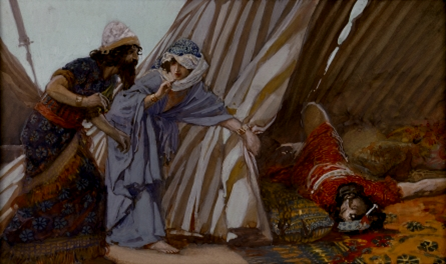Judging the Judges: Searching for Value in these Problematic Characters
The Role of the Judges in The Book of Judges
The judges do not appear in a vacuum; rather, they emerge as characters with the narrative of the book of Judges. Consequently, I would argue that the value of the judges must be discerned in light of their place in the narrative and message of the book of Judges. The judges are mentioned first in the prologue of the book (2.6-3.6), which outlines the cyclical framework for the series of stories to come in chs. 3-16. The cycle begins when the Israelites forget Yahweh and engage in idolatry. The behavior of the Israelites provokes Yahweh to anger, and he disciplines them by handing them over to an oppressive enemy. The Israelites then cry out to Yahweh for deliverance, and Yahweh is moved with compassion because of their suffering. Finally, Yahweh raises up a judge who saves the Israelites from their enemy, and the land enjoys a time of peace. Although each appearance of the cycle incorporates a unique combination of elements,37 the cycle can be reduced to two basic movements. First, the Israelites rebel and God punishes them; and second, the Israelites cry to God and he saves them.38 Both of these movements hinge on the responsiveness of Yahweh, who acts out of both judgment (sin/punishment) and mercy (cry/salvation) to preserve his covenant relationship to Israel.

Jael shows Sisera lying dead to Barak, c. 1896-1902, by James Jacques Joseph Tissot.
Image: Wikimedia Commons.
Although the actions of the judges relate on the surface to the second movement of the cycle (cry and salvation), at a symbolic level the lives of the judges intersect with the first movement (sin and punishment) as well. That is, the sin of Israel is reflected in the flaws of the judges. This symbolism develops out of the perspective toward Israel’s sin that is conveyed by the book of Judges. The besetting sin of the Israelites is breaking the covenant, forsaking Yahweh, and worshiping foreign gods—in a word: idolatry. Furthermore, the book of Judges presents Yahweh’s relationship to his people in corporate terms. The unfaithfulness of the Israelites, therefore, incurs Yahweh’s punishment of the entire people; and the cries of the Israelites elicit Yahweh’s compassion toward the entire body.39 Finally, the behavior of the Israelites grows worse throughout Judges (2.19); therefore, the repeated pattern represents more than a cyclical repetition; it is a downward spiral.40
This corporate downward spiral into unfettered idolatry is paralleled in the narrative by the problematic behavior of the judges themselves. The increasingly negative characterization of the judges mirrors the increasingly disobedient character of the Israelites and the overall spiritual decline within the book.41 Othniel is the ideal judge, a mighty warrior, who saves Israel from the oppressive king Cushan-rishathaim (3.7-11). The progression from the ideal (Othniel) to the worst of the judges (Samson) begins subtly with the second judge Ehud, who has no major flaws; but his left-handedness makes him less than ideal (3.15). Deborah is also without fault, but her gender may have presented her with distinct challenges in the male-dominated society. Barak is the first judge to show a hint of weakness, when he hesitates to follow the instructions of Deborah (4.6).42 Gideon, the next judge, is a full-fledged coward (6.27), who requires repeated assurances from God and who unwittingly leads Israel back into idolatry (8.27).43 Jephthah, the son of a prostitute, is an outcast from society who is chosen not by God, but by the elders of Gilead. Jephthah foolishly vows to offer up as a whole burnt offering the first person (or thing) who comes out to greet him on his safe return from battle (11.30-31). Jephthah saves the Israelites from only one of the two nations who threaten the Israelites (10.7), thus being the first judge who fails to bring complete deliverance. Finally, Samson does not save Israel at all; he only ‘begin[s] to save’ them from the Philistines (13.5) through the limited impact of his brief skirmishes.44 Samson is the only judge who is does not raise an army of Israelites and inspire a rebellion against their oppressor. Samson is the only judge who is captured by the enemy. The story of Samson, however, ends with a ray of hope, as he cries out to Yahweh who restores his strength, enabling him to destroy the temple of Dagon, thus striking at the very heart of the enemy’s god.45 In spite of Samson’s final individual effort, however, the downward spiral is complete, as the Israelites are content to live under the domination of the Philistines (15.11). Samson serves as a paradigmatic figure, whose feeble response to divine gifting represents the inability of all Israel to remain loyal to the covenant.46 At the end of Judges anarchy and immorality reign supreme, and the Israelites do as they please because there is no king—neither human nor divine—in Israel (17.6; 18.1; 19.1; 21.25).
The foregoing sketch of Judges suggests that the flaws of Barak, Gideon, Jephthah, and Samson are essential to the theological message of the book of Judges and carry a significant spiritual warning. The increasingly problematic character of the judges parallels the increasingly disobedient character of the Israelites. If the writer of Judges had chosen to downplay the failures of these final judges, the narrative impact of the book would have been greatly diminished. The sin of the judges, in conjunction with the sin of Israel, registers a valuable spiritual message, though a negative one.
Category: Biblical Studies, Fall 2010


